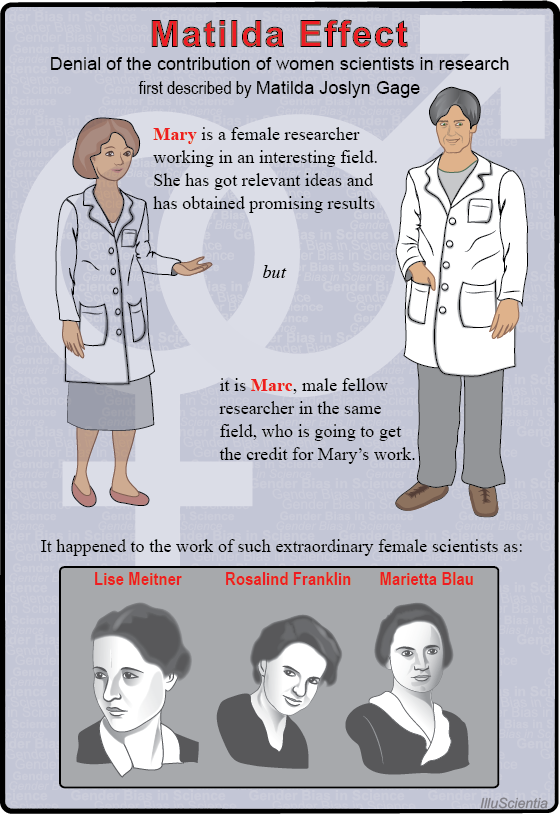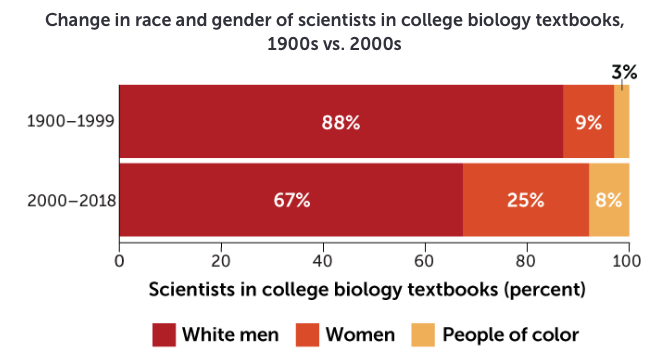It is no coincidence that my website motto is “There have always been highly capable women wanting to be scientists,” by Rita Colwell, PhD. But the fact is, even if there have always been women wanting to be scientists, their contributions to the scientific field have been underrated [1] . Although I knew this to be a fact, I didn’t realize there was a term for this phenomenon until recently. Known as the Matilda Effect, it was named after Matilda Gage, an American suffragist who experienced and described this phenomenon. I believe Dale Spender provides an excellent explanation of the Matilda Effect while talking about its’ namesake:
“Despite her analysis, her energy, her actions, she has been negated and denied. Unable to use her ideas, patriarchy has elected to lose them. It is as if she had not existed. Yet it seems to me from the few fragments I have been able to piece together, that she, more than any other woman of the past understood the process of denial of woman’s existence, the theft of woman’s being, in a male-dominated society.”[1]

This didn’t just happen to Matilda, but to many other scientists and it is still occurring. This shouldn’t be surprising to us as we live in a world where not a single woman won a science Nobel Prize in the year 2021. In fact, throughout the Nobel Prize’s 119 year history, only 3% of the science winners have been women and zero have been African American. [2]
The white male majority does not end with the Nobel Prize, but is present in our college Biology textbooks. From the 1600s through 1900, no women were mentioned in science textbooks. This improves only marginally in the 1900s through the 2000 with 9% of scientists being women and 3% of persons of color. From 2000 through 2018, women’s presence has increased to 25% and persons of color to 8%. However, it will take decades for our textbooks to catch up to the diversity actually present in the sciences. It is estimated to take 28 years to catch up to the presence of women in science, 50 years for Asian scientists, 30 years for Hispanic/Latinx scientists, and 500 years for African American scientists. [3] All in all, we can obviously do better. But how?

1. First, education. Start using this term the Matilda Effect. Call it out when you notice it. We cannot improve scientific representation without realizing that it is in fact not representative of our community.
2. Talk about the lack of representation in science!
3. Talk to children, teens, and adults about a career in science. We need creative minds in STEM!
4. Remember the Instagram handle #thisiswhatascientistlookslike? Let’s keep using it! It is incredible to see all the unique fields and what people are studying.
5. Support each other. A career in science is not easy which makes having good mentors an essential. This does not always have to occur in person, but can occur through social media as well. Get involved on twitter with #ScienceTwitter or #Academic Chatter. There’s also a great community of PhD and Graduate students on Instagram #phdstudent, #phdproblems, and more!
6. Looking for more ideas to support scientists? Check out this publication: https://www.nature.com/articles/s41557-020-0529-x (Urbina-Blanco, C.A., Jilani, S.Z., Speight, I.R. et al. A diverse view of science to catalyse change. Nat. Chem. 12, 773–776 (2020). https://doi.org/10.1038/s41557-020-0529-x)
Peter Medawar first wrote “the world is now such a complicated and rapidly changing place that it cannot even be kept going (let alone improved…) without using the intelligence and skill of approximately 50 percent of the human race.”
We may not have won the Nobel Prize or be named in our science textbooks, but women have always been a part of science and we always will be. The difference is, we now have a stronger voice to push for diversity. Although scientific careers for women have improved, there is still much work to be done. There’s no time to waste. Let’s get started.
We may not have won the Nobel Prize or be named in our science textbooks, but women have always been a part of science and we always will be. The difference is, we now have a stronger voice to push for diversity. Although scientific careers for women have improved, there is still much work to be done. There’s no time to waste. Let’s get started.
Want to learn more about the history of hidden women in science? Check out Margaret Rossiter’s work! She coined the phrase the Matilda Effect and has written several books about women scientists in America.
Additionally, I cannot recommend Rita Colwell’s, PhD book “A Lab of One’s Own” enough! It not only talks about her research, but her experience as a female PhD student, principal investigator, and shares other women’s’ stories too. She also brings to light what it was like to be a woman in science in the mid to late 1900’s through 2019.
Sources:
1. Rossiter, M. W. (1993). The Matthew Matilda Effect in Science. Social Studies of Science, 23(2), 325–341. http://www.jstor.org/stable/285482
1. Rossiter, M. W. (1993). The Matthew Matilda Effect in Science. Social Studies of Science, 23(2), 325–341. http://www.jstor.org/stable/285482